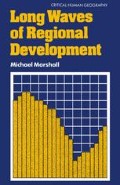Abstract
The last two chapters examined the role of uneven regional development in the nineteenth-century rise of British industrial capitalism. It has been shown that the dominant direction of industrial development and change in the national economy was by no means mirrored in the pattern of development in all the nation’s component regions. Interregional differences were an important determinant of the overall national pattern and, because of the British economy’s dominant global position at that time, these regional differences sometimes had impacts of an international significance. Chapter 7 now goes on to examine the regional dimension to twentieth-century fluctuations in British economic development. It is suggested that the ‘regional problem’, which was itself in no small part a product of the nineteenth-century patterns of development, was reflected in spatially uneven cyclical fluctuations of the British economy.
Preview
Unable to display preview. Download preview PDF.
Copyright information
© 1987 Michael Marshall
About this chapter
Cite this chapter
Marshall, M. (1987). Economic Fluctuations and the ‘Regional Problem’. In: Long Waves of Regional Development. Critical Human Geography. Palgrave, London. https://doi.org/10.1007/978-1-349-18539-9_8
Download citation
DOI: https://doi.org/10.1007/978-1-349-18539-9_8
Publisher Name: Palgrave, London
Print ISBN: 978-0-333-41984-7
Online ISBN: 978-1-349-18539-9
eBook Packages: Palgrave Social & Cultural Studies CollectionSocial Sciences (R0)

